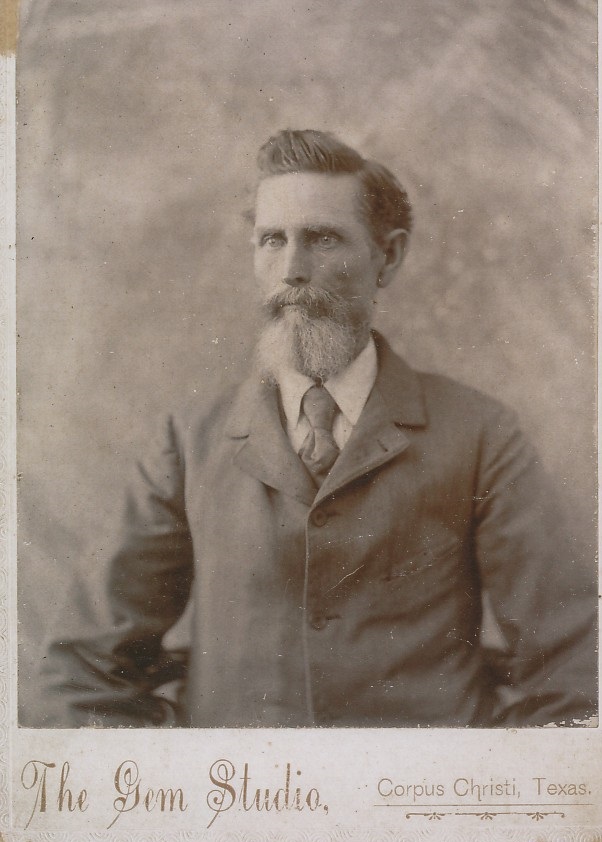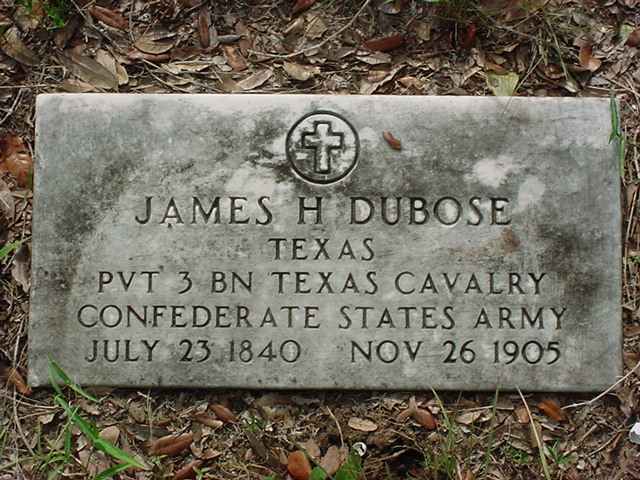Once upon a time in the South, there were a couple fellas named Dubose, a father and his boy, who were fighting for the Confederacy. Neither one owned a single slave. In fact, no one in their family had owned a slave (according to the census records I read through) since the elder one’s grand-daddy had been a boy in Alabama. The family had sold the plantation and moved to Louisiana and then on to Texas. These were just a couple of cowboys in what was then called The Great Horse Desert (the South Texas area just west of Corpus Christi and down to the Rio Grande.) They didn’t rush off to war when Sumter fell. They stayed home – herding cattle and growing cotton.

It’s a myth that we like to tell in this country that the Confederacy was all about slavery, and that the people who fought did so out of an overwhelming sentiment of white supremacy. We’ve created this narrative that has the North as the kind-hearted and benevolent victors and the South as hot-headed pre-Nazi skinheads. While there is truth in the adage that the victors write the history, there are a lot of times that many of us Southern-folk wonder what the heck happened to the rest of the story.
My family didn’t fight for slavery. If they had, they’d have certainly gone to war a lot sooner than they did.
It took the Yankee blockades of the Texas Gulf Coast to get our fellas to start thinking war. It wasn’t until they were unable to get their cotton and livestock to market and their kids got hungry that they made any move against the Union at all. Once they’d starved long enough and watched a season’s cotton mildew in the barn, they chose to avoid outright conflict with Union Troops, and opted to join up with Capt Richard King’s men in running the Union’s blockades.

Capt King and his men ran an elaborate scheme of taking the cotton for the entire Confederacy from the Texas/Louisiana border all of the way across Texas to Brownsville were they evaded capture by shipping out under a Mexican flag. King’s men ensured that the South had the money to keep fighting, and his men included their own crops in the shipments and made a little profit.
The Yankees were not a fan of their cleverness, and burned down the houses and running off or shooting the herds of cattle belonging to the men riding with King. The Dubose place (our homestead) was burned twice, with one of the youngest daughters dying in the second fire.
It was then that they went to join what history remembers as the Civil War, and my Grandmother still bitterly refers to as “The War of Northern Aggression.” For the people in South Texas, and other parts of the state, it was. We’d avoided war until we were starved, our homes burned over our heads, and our livelihoods destroyed. Then they did the only sane thing they could, they took up arms and joined the fight against the men who were leading an assault on their families.
If I were in their position, I can’t see that we would have any choice but to fight against such tyranny.
In any case, my ancestors did take up guns against the Union, fought at Gettysburg, lost friends and loved ones along the way, and eventually returned home to the ruined Texas homestead where they went back to farming cotton and raising cows.
It’s hard for me to look back at the reality of why my family fought for the Confederacy and see the Hateful Heritage and shame that popular culture seems to think should be my birthright as a Southerner. I’m not at all offended that my kinfolk were Johnny Rebs. I am, instead, proud that they tried to stay out of the mess until the Yankees brought the fight down here and forced it upon them.
There are two sides to any conflict, and there has never been an army which has avoided committing wartime atrocities. The Army of the North is no exception. Those families who fought for the South had to swallow a bitter pill of defeat followed by the infamy of Restoration and Carpet Baggers.
You see, this is our history. It’s not simply a history of slavery, but a story of personal survival and endurance. We don’t immediately see the Grays as the bad guys, and the Blues as the heroes the way the rest of the country does.

We don’t look at pictures of Confederate soldiers and see racists monsters who had to be stopped. We see our kin. We see men who fought and died to protect their families. We look at the Union soldiers and don’t see gallantry and heroism. We see the men who blockaded ports, starved families, and burned roofs over sleeping 3-year-old girls.We see men who enforced the order that ended slavery, and while we adamantly agree that that was a good thing*, we also see the horrific cost.
When the Yankees marched home to victory parades, our people were left to clean up the mess and bury their dead, and fight the tyranny of Carpet Baggers and their illegitimate governments for years to come.
There are those from other parts of the country (mostly the Northeast and the West Coast) who have set upon a media campaign to use whatever means possible to shame Southerners into removing any trace of the Confederacy from public spaces. In doing so they reveal their own ignorance of history as well as their ignorance of Southern people.
There are also many people in the South who see these flags and statues as a kind of war memorial to those who died, as well as those who survived the many atrocities visited upon them by the invading Yankee armies. The moment that people from the Not-South began their MoveOn petitions and social media campaigns, the folks here dug in their heels and began declaring that “No Damn Yankee is going to come into my house and push me around.”
There’s a legacy of pain for a lot people down here, Black and White, that the rest of the country would like to ignore their part in creating, and it goes way beyond slavery and racism.
*Yes, there are still racist loonies running around down here, and chances are we all have that one cousin, but we don’t like him any more than you do. We eat Thanksgiving supper with him because MeMaw tells us to, and we love her.
Photo credits: Cowboys – William Henry Jackson [Public domain], via Wikimedia Commons
the rest are from my family’s private collection















